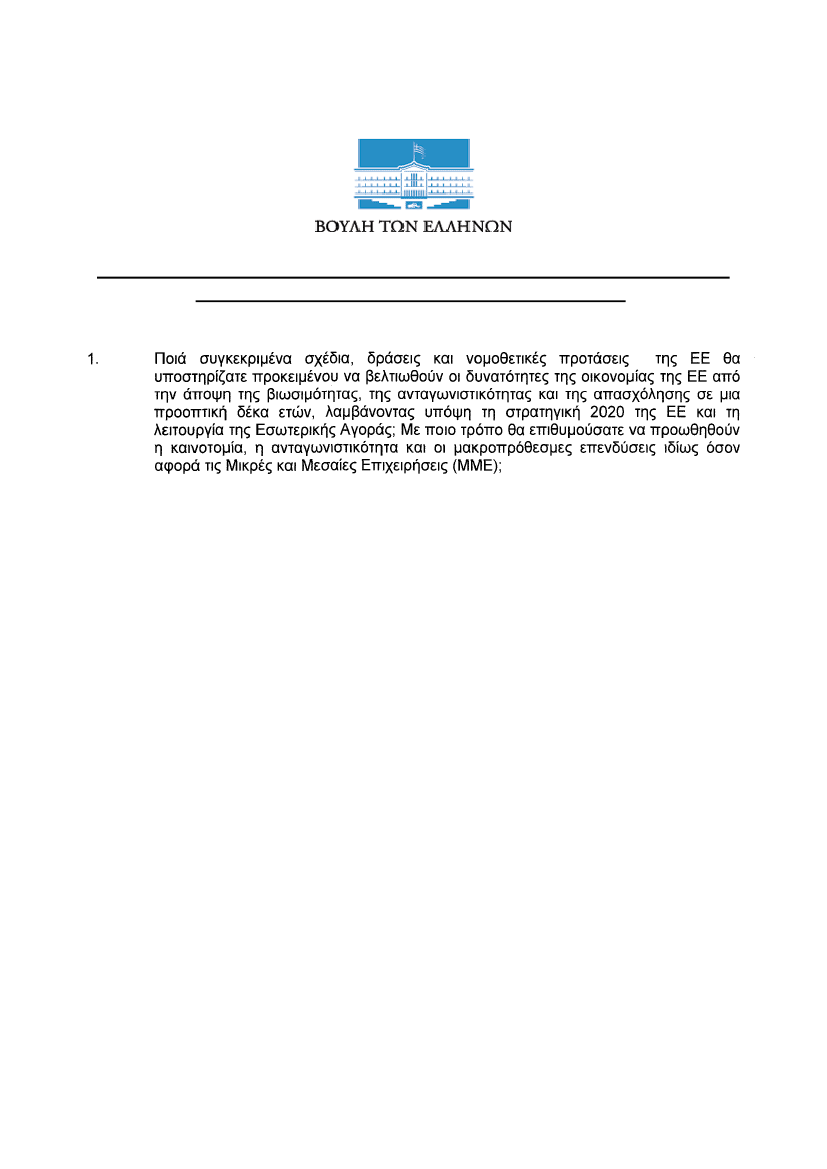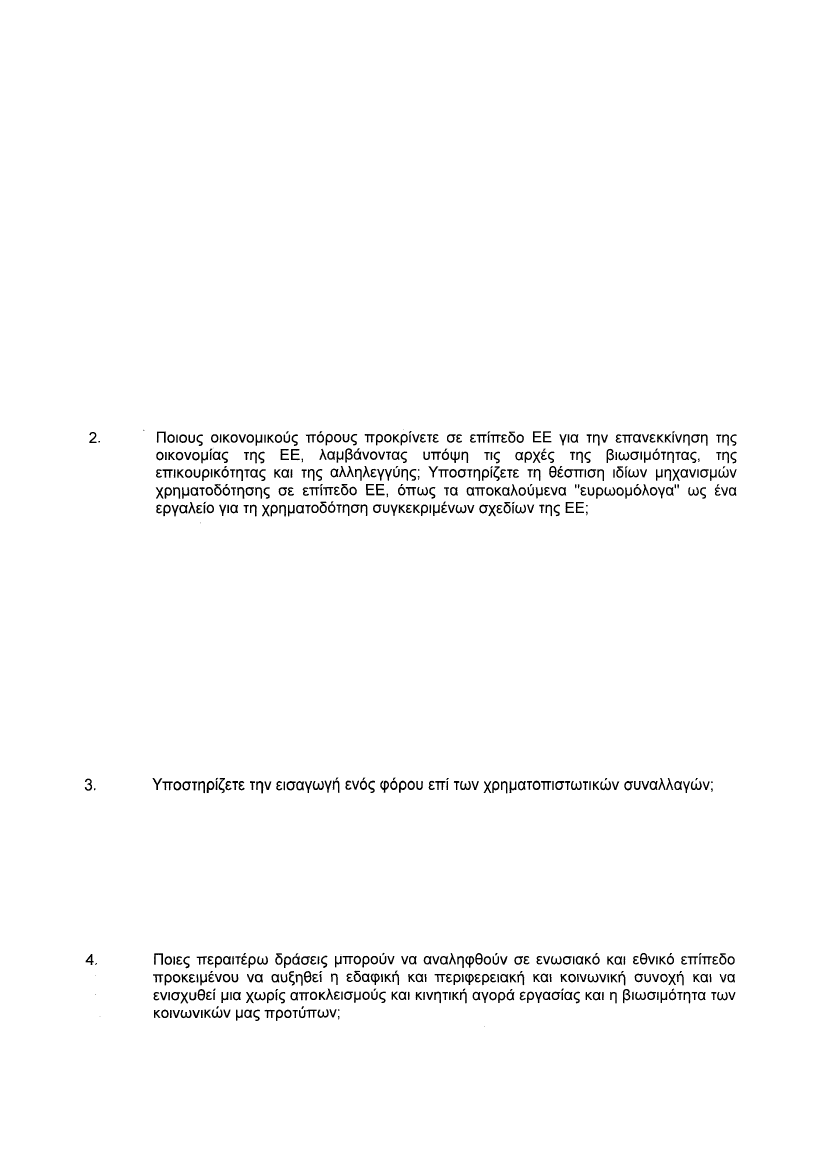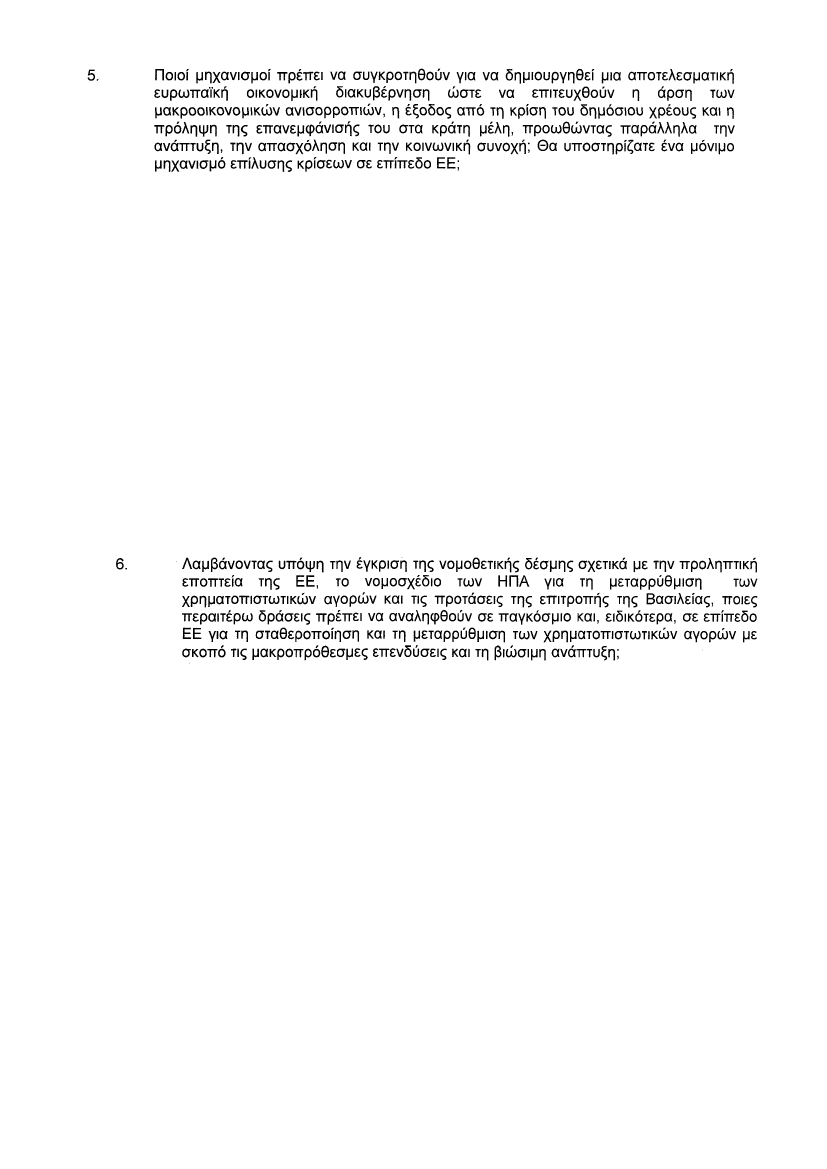Europaudvalget 2010-11 (1. samling)
EUU Alm.del Bilag 277
Offentligt
Ερωτηματολόγιο της Ειδικής Επιτροπής του Ευρωπαϊκού Κοινοβουλίου για τηΧρηματοπιστωτική, Οικονομική και Κοινωνική Κρίση.
Η Ευρωπαϊκή Ένωση βιώνει μία ιδιαίτερα δύσκολη περίοδο λόγω της χρηματοπιστωτικής και τηςδημοσιονομικής κρίσης που βρίσκεται σε εξέλιξη πλήττοντας κυρίως τις αδύναμες χώρες-μέλη της,όπως αναφέρεται και στο ψήφισμα (σημεία 14, 15, 16, 19, 19, 20). Οι επιπτώσεις της κρίσης όσοναφορά την οικονομική, κοινωνική και περιφερειακή συνοχή θα πρέπει να αντιμετωπιστούν απόπολιτικές που απευθύνονται στα συγκεκριμένα προβλήματα με διαφοροποιημένο τρόπολαμβάνοντας υπόψη τα διαφορετικά επίπεδα ως προς την ανταγωνιστικότητα και τις ιδιαιτερότητεςτης κάθε χώρας. Επίσης θα πρέπει να ληφθούν μέτρα για το χρηματοπιστωτικό σύστημα που θαδιασφαλίζουν την αποτελεσματική ρύθμιση, εποπτεία και διαφάνεια των αγορών.Με βάση όσα αναφέρονται στο σημείο 150 του ψηφίσματος, θεωρούμε ότι η στρατηγική για τηπερίοδο μετά τη κρίση θα είναι περισσότερο αποτελεσματική αν στηρίζεται στην πολυεπίπεδηδιακυβέρνηση, όπου οι περιφέρειες και οι πόλεις θα έχουν τη δυνατότητα να συμμετέχουν ενεργάκαι να κινητοποιούν τα εργαλεία πολιτικής και το ανθρώπινο δυναμικό που διαθέτουν.Με αφορμή, τις αναφορές του σημείου 126 του ψηφίσματος υπογραμμίζουμε επίσης τηναναγκαιότητα η στρατηγική ΕΕ 2020 να αποτελέσει το πλαίσιο ενός προγραμματισμού για τηνανάπτυξη και την απασχόληση, με στόχο να αντιμετωπισθεί η δημοσιονομική κρίση και ναενισχυθεί η εσωτερική αγορά. Επιπλέον, θεωρούμε θεμελιώδες ζήτημα (ως σημείο 124ψηφίσματος) να ληφθεί υπόψη η κοινωνική διάσταση και να περιληφθεί μια κοινωνική ρήτρα σεόλα τα νομοθετήματα που σχετίζονται με την εσωτερική αγορά, νομοθεσία για τις υπηρεσίεςγενικού οικονομικού συμφέροντος, νομοθετική ατζέντα για την ενίσχυση των δικαιωμάτων τωνεργαζομένων, μια ουσιαστική νομοθετική δέσμη για τη προστασία των καταναλωτών ,καθώς καιέναν βελτιωμένο φορολογικό συντονισμό μέσω της εναρμόνισης της βάσης του φόρου εταιρειώνκαι των συντελεστών ΦΠΑ.Όσον αφορά τις ΜΜΕ, οι οποίες αποτελούν τη ραχοκοκαλιά της οικονομίας και είναι η κύριαπηγή νέων θέσεων εργασίας και εισοδήματος, θα πρέπει να ληφθούν ουσιαστικά μέτρα για τηνστήριξη τους. Όπως εύστοχα αναφέρεται και στο σημείο 206 του ψηφίσματος, τα κράτη μέλη θα1
πρέπει να στηρίξουν το μερίδιο της χρηματοδότησης μέσω κεφαλαιαγορών και συμπράξεωνδημόσιου-ιδιωτικού τομέα, ενώ παράλληλα θα πρέπει να μειωθεί σημαντικά η εν γένειγραφειοκρατία για τις ΜΜΕ και ειδικότερα στο τομέα των δημοσίων συμβάσεων.Εξάλλου, ο στόχος του να στραφούν η βιομηχανία και οι ΜΜΕ προς τη καινοτομία δεν θαεπιτευχθεί απλώς με τη βελτίωση των όρων πρόσβασης σε κεφάλαια εν γένει, αλλά και μέσω τηςδιαφοροποίησης των πηγών χρηματοδότησης. Επιπρόσθετα, προκειμένου η Ευρώπη να μπορέσεινα αποκατασταθεί σαν ευνοϊκός τόπος για επενδύσεις και ανάπτυξη, να προσελκύσει ξένεςεπενδύσεις και να προάγει τη καινοτομία, θα πρέπει τα χρηματοπιστωτικά ιδρύματα ιδιωτικά καιδημόσια να καταβάλλουν κάθε δυνατή προσπάθεια προκειμένου οι χρηματοπιστωτικές αγορές ναλειτουργούν προς όφελος της πραγματικής οικονομίας και των ΜΜΕ.Ολοκληρώνοντας, θα θέλαμε να επισημάνουμε ότι θα έπρεπε επίσης να αναφερθεί στο ψήφισμαότι, προκειμένου η ΕΕ να κερδίσει το στοίχημα της ανταγωνιστικότητας, θα πρέπει να επιδιώξειμια ακόμα πιο δυναμική παρουσία στις διεθνείς αγορές και κυρίως τη διείσδυση και καθιέρωσητων ευρωπαϊκών προϊόντων στις αναδυόμενες οικονομίες.
Η Ελλάδα είναι υπέρ της έκδοσης ευρωομολόγων ως απάντηση στις πιέσεις που υφίστανται οιπεριφερειακές οικονομίες της ευρωζώνης. Η έκδοση του ευρωομολόγου θα βοηθήσει στηναποκατάσταση της εμπιστοσύνης, θα μειώσει τα επιτόκια των κρατικών ομολόγων με σημαντικήεπίδραση στην τόνωση της ανάπτυξης και στην ανακατανομή πόρων υπέρ αναπτυξιακών καικοινωνικών πολιτικών. Η ύπαρξη του ευρωομολόγου θα αυξήσει τη ρευστότητα στην αγορά που θαωφελήσει τους επενδυτές. Παράλληλα, θα ενισχύσει τη δημοσιονομική πειθαρχία των κρατών-μελών, ενώ η αποκλιμάκωση των πιέσεων θα ωφελήσει και τις χώρες που δεν δέχονται πιέσειςμέσω της αποκατάστασης της εμπιστοσύνης στην ευρωζώνη.
Υποστηρίζουμε την εισαγωγή ενός φόρου επί των χρηματοπιστωτικών συναλλαγών. Θα πρέπειβεβαίως να αποφευχθεί ο κίνδυνος της διπλής φορολογίας και να δοθεί ιδιαίτερη προσοχή στοντρόπο επιβολής του φόρου, ώστε να μη δημιουργεί προβλήματα στα ίδια κεφάλαια των τραπεζώνκαι/ή στην ανταγωνιστικότητά τους.
Με βάση το κείμενο του ψηφίσματος του Ευρωπαϊκού Κοινοβουλίου της 20ηςΟκτωβρίου 2010σχετικά με τις συστάσεις για τα ενδεικνυόμενα μέτρα προς αντιμετώπιση της χρηματοπιστωτικής,οικονομικής και κοινωνικής κρίσης, σημειώνουμε τις παρατηρήσεις μας στα ακόλουθα άρθρα:2
Σημείο 34:Εκφράζουμε τις επιφυλάξεις μας στα θέματα επικουρικότητας (subsidiarity) που θίγει τοπαρόν σημείο. Η ανάληψη πλήρους ευθύνης από την Ευρωπαϊκή Επιτροπή όσον αφορά στηνεξασφάλιση της καθοδήγησης και χρηματοδότησης σχεδίων στους αναφερόμενους τομείς, αφενόςδε συνάδει με την αρχή της επικουρικότητας και αφετέρου ενδέχεται να οδηγήσει σε αύξηση τωνπόρων που διαχειρίζεται με ευθύνη της η Ευρωπαϊκή Επιτροπή για προγράμματα πλαίσιο πουχρηματοδοτούνται από τη γραμμή 1ατου προϋπολογισμού, σε βάρος ενδεχομένως της ΚοινήςΑγροτικής Πολιτικής ή/και της Πολιτικής της Συνοχής.Σημείο 75:Υποστηρίζουμε ότι μεταξύ των πολιτικών με μεγαλύτερη επιτυχία περιλαμβάνεται και ηΠολιτική της Συνοχής, που αποτελεί βασικό παράγοντα αλληλεγγύης και συντελεί στηναντιμετώπιση της κρίσης και στη μείωση των περιφερειακών ανισοτήτων, και τούτο θα πρέπει νααναδεικνύεται.Σημείο 101, 102, 104:Εκφράζουμε τις επιφυλάξεις μας για την προώθηση και εφαρμογή κυρώσεωνγια την εφαρμογή του Συμφώνου Σταθερότητας και Ανάπτυξης συνδεδεμένων με την Πολιτική τηςΣυνοχής. Ωστόσο, είμαστε θετικοί στην εφαρμογή κινήτρων για κράτη-μέλη και περιφέρειες, με τηνεφαρμογή ενδεχομένως αποθεματικού επίδοσης για τα Διαρθρωτικά Ταμεία σε εθνικό επίπεδο.Σημείο 155:Η βελτίωση της οικονομικής, κοινωνικής και εδαφικής συνοχής θα πρέπει ναεφαρμόζεται στο σύνολο της Ευρωπαϊκής Ένωσης και η μείωση των ανισοτήτων να αφορά τιςυστερούσες περιφέρειες έναντι των ανεπτυγμένων και όχι να αναδεικνύονται διαχωρισμοί μεταξύπαλαιών και νέων κρατών-μελών.Σημείο 163:Θα πρέπει να είμαστε ιδιαίτερα προσεκτικοί στην εφαρμογή του τύπου, του εύρους καιτης έντασης των ενδεχόμενων δεσμευτικών μέτρων για την υλοποίηση της στρατηγικής ΕΕ2020 πουσυνδέεται με τα «μέσα» της Ευρωπαϊκής Ένωσης, καθώς τα δύο σημαντικότερα μέσα που ενδέχεταινα χρησιμοποιηθούν και που διαθέτει η Ευρωπαϊκή Ένωση είναι η Πολιτική της Συνοχής και η ΚοινήΑγροτική Πολιτική. Συμφωνώντας με τη στρατηγική ΕΕ2020 και τις νέες προκλήσεις που αυτή θέτει,θα ήταν σκόπιμη η επιδίωξη αύξησης των πόρων που κατευθύνονται στις δύο παραπάνω πολιτικέςπροκειμένου να επιτευχθεί, αφενός η εξυπηρέτηση των στόχων της στρατηγικής ΕΕ2020 καιαφετέρου η αναγκαιότητα ευελιξίας, όπως αναφέρεται και στο κείμενο, στις στρατηγικές επιλογέςτων περιφερειών σύμφωνα με τις ιδιαιτερότητές τους.Σημαντικές δράσεις που θα πρέπει να αναληφθούνστο επίπεδο της ΕΕ και σε εθνικό επίπεδοπροκειμένου να αυξηθεί η εδαφική και περιφερειακή συνοχή και να ενισχυθεί μια χωρίςαποκλεισμούς και κινητική αγορά εργασίας και η βιωσιμότητα των κοινωνικών μας προτύπων,συνίστανται στα εξής: αξιοποίηση των συγκριτικών πλεονεκτημάτων και προώθηση επενδύσεωνστο πλαίσιο μιας συγκροτημένης και συνεκτικής στρατηγικής βιώσιμης ανάπτυξης, αξιοποίηση τουανθρωπίνου δυναμικού, καταπολέμηση τηςανεργίαςκαι δημιουργία νέων ευκαιριώναπασχόλησης, βελτίωση της ανταγωνιστικότητας και ενθάρρυνση των καινοτομικών παρεμβάσεωνσε όλους τους τομείς της παραγωγικής δραστηριότητας, υιοθέτηση μιας εξωστρεφούς πολιτικήςπου συμβάλλει στην αύξηση των εξαγωγών και στην ανάπτυξηαμοιβαία επωφελούςοικονομικής συνεργασίας με άλλες χώρες.
3
Η πρόσφατη κρίση κατέδειξε την ανάγκη για την υπεράσπιση του κοινού μας νομίσματος, τιςπροσπάθειες για τη βελτίωση των ευρωπαϊκών μηχανισμών οικονομικής διακυβέρνησης μέσω τηςενίσχυσης της δημοσιονομικής πειθαρχίας ενώ και η επιβολή της μακροοικονομικής εποπτείας θαπρέπει να ενισχυθεί. Στο πλαίσιο αυτό, η έναρξη του Ευρωπαϊκού εξαμήνου από το 2011 είναι μιααλλαγή που θα οδηγήσει σε ένα ενισχυμένο εκ των προτέρων συντονισμό ο οποίος θα καλύπτειόλα τα στοιχεία της οικονομικής εποπτείας του Συμφώνου Σταθερότητας και Ανάπτυξης.Υποστηρίζουμε τον μόνιμο μηχανισμό επίλυσης κρίσεων σε επίπεδο ΕΕ, που θα βοηθήσει κράτη-μέλη που βρίσκονται σε μια δύσκολη συγκυρία, να ξεπεράσουν τα προβλήματά τους. Αν καιαναγνωρίζουμε ότι θα υπάρχουν κυρώσεις, θα πρέπει να εξεταστούν προσεκτικά, ούτως ώστε ναμη δημιουργούν περισσότερα προβλήματα από αυτά που πάνε να λύσουν. Τέλος, είμαστε ενάντιαστις πολιτικές κυρώσεις και ιδιαίτερα στην ιδέα της αφαίρεσης του δικαιώματος ψήφου, μιας καιμια τέτοια εξέλιξη υπονομεύει τελικά τη δημοκρατική βούληση των πολιτών.
Οι πρόσφατες πρωτοβουλίες που ελήφθησαν σε επίπεδοG20είναι προς τη σωστή κατεύθυνση καιέχουν ως σκοπό την καλύτερη λειτουργία του χρηματοπιστωτικού συστήματος και την αποφυγήμελλοντικών κινδύνων για την εκδήλωση αναλόγων κρίσεων, όπως αυτή του πρόσφατουπαρελθόντος. Υποστηρίζουμε όλες τις διεργασίες που διεξάγονται σε επίπεδο ΕΕ, αλλά πρέπει ναεπιταχυνθούν και ολοκληρωθούν οι διαδικασίες για την δημιουργία ενός νέου ευρωπαϊκούπλαισίου χρηματοπιστωτικής εποπτείας και λειτουργίας των αγορών. Πιο συγκεκριμένα,επιθυμούμε τον αποτελεσματικότερο έλεγχο τωνOTC Derivatives ,όπου θα λειτουργούν μεμεγαλύτερη διαφάνεια και με μικρότερο κίνδυνο. Οι οίκοι αξιολόγησης θα πρέπει επίσης ναλειτουργούν με πιο αυστηρά κριτήρια και μεγαλύτερο έλεγχο για να παράγουν όσο το δυνατόν πιοαντικειμενικές εκτιμήσεις. Παράλληλα, επιθυμούμε μεγαλύτερο έλεγχο στη λειτουργία τωναντισταθμιστικών ταμείων(hedge funds)όπου θα λειτουργούν κάτω από ένα ενιαίο πλαίσιοπαρακολούθησης των κινδύνων. Τέλος, επιθυμούμε περιορισμό στη λειτουργία και την επέκτασητωνShort SellingκαιCredit Default Swaps,που ευθύνονται σε μεγάλο βαθμό για κερδοσκοπικέςεπιθέσεις και αδικαιολόγητη άνοδο των επιτοκίων.
4
Η εργασία που έχει γίνει μέχρι στιγμής στα πλαίσια τουG20είναι πολύ σημαντική και μέσω τηςσυνεργασίας των κύριων παγκόσμιων οικονομιών, οι επιπτώσεις της οικονομικής καιχρηματοπιστωτικής κρίσης μετριάστηκαν. Παρόλα αυτά, το φόρουμ τουG20θα πρέπει να έχειμεγαλύτερη συμμετοχή και από άλλες χώρες. Στα πλαίσια της ΕΕ, θεωρούμε ότι θα πρέπει ναενισχυθεί ο συντονισμός των χωρών-μελών και να υπάρχει περισσότερη προετοιμασία στηδιατύπωση θέσεων ενόψει των συναντήσεων τουG20.Οι ευρωπαϊκές χώρες-μέλη τουG20θαπρέπει να συντονίσουν τις θέσεις τους με τις κοινές ευρωπαϊκές. Αναφορικά με τη μεταρρύθμισητου ΔΝΤ, στηρίζουμε τις πρόσφατες αλλαγές. Πιστεύουμε ότι το μέγεθος του ΕκτελεστικούΣυμβουλίου είναι το σωστό, και θα πρέπει να ο υφιστάμενος αριθμός να μπει στις Διατάξεις τηςΣυμφωνίας του ΔΝΤ. Θέλουμε την ίση διαχείριση αναπτυγμένων και αναδυόμενων οικονομιών, καιτο ποσοστό κάθε χώρας να είναι ανάλογο με την οικονομική της θέση, όπως υπολογίζεται από τηνυφιστάμενη φόρμουλα.
5
CRIS COMMITTEE QUESTIONNAIRE - UNOFFICIAL TRANSLATION OF GREEK
TEXT
1.What specific EU projects, actions and legislative proposals would you favour in order to improvethe potential of the EU economy in terms of sustainability, competitiveness and employment in aten-year perspective, taking into account the EU 2020 strategy and the functioning of the InternalMarket? How would you like to promote innovation, competitiveness and long term investmentsparticularly for Small and Medium Enterprises (SMEs)?The European Union is undergoing an extremely difficult period due to the ongoing financial andfiscal crisis, which mostly affects its weak member-states, as stated in the resolution ( points 14, 15,16, 18,19, 20)). The crisis’ effects in what concerns the economic, social and regional cohesion mustbe dealt with through policies addressing specific problems in a differentiated way , taking intoconsideration different levels regarding competitiveness, as well as each country’s specialcircumstances. Moreover, measures must be taken as far as the financial system is concerned, whichwill guarantee the markets’ effective regulation, oversight and transparency.Based on those mentioned in point 150 of the resolution, we deem that the post-crisis strategy shall bemore effective if founded upon multilevel governance, whereby regions and cities shall be providedwith the opportunity to participate actively and mobilize policy and human resources tools at theirdisposal.Triggered by the references in point 126 , we also stress the necessity for strategy EU 2020 toconstitute the frame of development and employment planning , aiming at dealing with the financialcrisis, as well as at strengthening the internal market. Moreover, we consider fundamental (point 124)to take into consideration the social dimension and to include a social clause into all legislative actsrelated to the internal market, legislation on economic services of a general economic interest,legislative agenda on strengthening employee rights, a substantial legislative package on consumerprotection, as well as an enhanced tax coordination through the harmonization of companies’ base taxand VAT factors.In what concerns the SMEs , which are the baseline of economy , as well as the main source of newemployment posts and of revenue, substantial measures must be taken for their support. As aptlypointed out in point 206, member-states must support financing shares through capital markets andjoint projects between public and private sector, whereas, at the same time, bureaucracy in general –SME related- must be significantly reduced , especially in the field of state contracts.What is more, the goal of turning industry and SMEs towards innovation cannot be achieved only bygenerally facilitating access to capital , but also though differentiating financing sources. In addition,in order to restore Europe as a favorable area concerning investments and development, to attract6
foreign investments and promote innovation, financial institutions, both public and private, must makeevery effort possible so that financial markets function to the benefit of real economy and SMEs.Closing, we wish to point out that the resolution should also include the point that the EU, in order tobe a winner before the competitiveness challenge, must strongly pursue an even more dynamicpresence in international markets, as well as the penetration and establishment of European productsin the emerging markets.
2.What financial resources do you favour at EU level in order to re-launch the economic recoveryof the EU, taking into account the principles of sustainability, subsidiarity and solidarity? Are youin favour of introducing own financing mechanisms at EU level, such as so-called 'Euro-bonds' asa tool to finance specific EU projects?Greece favors the issuing of Eurobonds as a response against pressures suffered by Euro-zone regionaleconomies. Issuing Eurobonds will help towards restoring trust and reducing state bonds rates,substantially affecting development invigoration, as well as resource redistribution in favor ofdevelopment and social policies. The Eurobond will increase cash flow in the market, which, in turn,will favor investors. At the same time, it will strengthen member-states’ financial discipline , whereasde-escalation of pressures shall benefit as well countries not suffering pressures, through therestoration of trust in the Euro-zone.
3.Are you in favour of the introduction of a financial transaction tax?We are in favor of introducing a financial transaction tax. Of course, the risk of double taxation mustbe avoided and special attention must be given on the way of imposing the tax, so that it does notcreate problems in banks’ equity capitals and/or their competitiveness.
4. What further actions can be undertaken at EU and national level in order to increase territorialand regional and social cohesion and stimulate an inclusive and mobile labour market and thesustainability of our social patterns?
Based on the European Parliament’s resolution text of October 20th, 2010 on recommended measuresand initiatives to be taken for dealing with the financial, economic and social crisis, we present ourremarks to the following articles:
34: we express concerns regarding subsidiarity issues, touched upon in this article. Taking fullresponsibility on the part of the European Commission in what concerns guidance and financing of7
projects in the fields mentioned, on the one hand does not conform with the subsidiarity principle andon the other hand it might lead to an increase of resources managed by the European Commission inits own responsibility for framework programmes financed by the 1stline of the budget, possibly at theexpense of the Common Agricultural Policy and/or the Cohesion Policy.
75: It is our view that the Cohesion Policy is one of the most successful policies, since it is a solidarityfactor and contributes to crisis management as well as to reducing inequalities, and this must behighlighted.
101, 102, 104: we express our concerns regarding the promotion and enforcement of sanctionsassociated with the Cohesion Policy for implementing the Stability and Growth Pact. However we arein favor of creating incentives for member-states and regions, possibly through the implementation ofefficiency reserves for structural funds at a national level.
155: improvements in economic, social and territorial cohesion must be implemented in the EuropeanUnion in its total, and reducing inequalities must be oriented towards regions lagging behindcompared to developed ones; dividing lines between the old and the new member-states should not beencouraged.
163: we must pay special attention in implementation of possible binding measures regarding theirtype, spectrum and intensity, in view of materialising EU 2020 strategy which is associated withEuropean Union “means” , since the two most important means the European Union has in its disposaland might be employed are Cohesion Policy and the Common Agricultural Policy. According toEU2020 strategy and the new challenges it brings about, it would be advisable to pursue a resourceincrease oriented towards the aforementioned two policies, in order to achieve on the one hand serving2020 strategy goals and on the other hand to meet the necessity for flexibility , as mentioned in thetext, in regions’ strategic choices, according to their particularities.
Important actions to be taken
at the EU level and at national level in order to improve territorial andregional cohesion , as well as to strengthen a non-excluding and mobile employment market and thesustainability of our social models consist of the following: utilisation of comparative advantages andpromotion of investments in the frame of a concrete and cohesive strategy for sustainabledevelopment , best use of human resources, combating of unemployment and creation of new jobopportunities , competitiveness improvement and encouragement of innovative interventions in allfields of productive activity, adoption of an extrovert policy to contribute to export increase as well asto the development of a mutually beneficial cooperation with other countries.85.Which mechanisms should be established to create effective European economic governance inorder to overcome macroeconomic imbalances, exit from the public debt crisis and prevent itsrecurrence in the Member States, while fostering growth, employment and social cohesion? Wouldyou favour a permanent crisis resolution mechanism at EU level?The present crisis has illustrated the need for defending our common currency, for efforts towardsimproving the European economic governance mechanisms, through strengthening fiscal discipline,whereas macro-economic surveillance must be strengthened as well. In this frame, the launching ofthe European semester as from 2011 is a change that will lead to a strengthened a priori coordinationwhich will cover all financial surveillance aspects of the Stability and Growth Pact. We support theidea of a permanent crisis resolution mechanism at the EU level, which will help member-statesundergoing harsh circumstances to overcome their problems. Even though we realise that there will besanctions, they must be examined closely, so as to not create further problems to those they areintended to solve. Closing, we are against political sanctions and especially the idea of suspending theright to vote, since such a development ultimately undermines the citizens’ will.
6. Given the adoption of the legislative package on EU prudential supervision, the US financialmarket reform bill and the Basel committee proposals, which further action should be taken atglobal and, in particular, at EU level in order to stabilize and reform the financial markets with aview to long term investment and sustainable development?Recent initiatives undertaken at the level of G20 are oriented to the right direction and are aimedtowards the better function of the financial system and the avoidance of future risk of similar crises,such as the recent one. We are in favour of all ongoing processes at the EU level, however, procedurestowards the creation of a new European frame for financial supervision and market operation mustspeed up to be completed. More specifically, we wish for a more effective control of OTCDerivatives, to function with more transparency and less risk. Rating agencies must operate understricter criteria and produce, as much as possible, more objective assessments. At the same time,further control should be exercised on hedge funds operation placing it under a uniform frame of riskmonitoring. Closing, we are in favour of limiting Short Selling and Credit Default Swaps’ operationand extent , since , to a large degree, they are to blame for speculative and profiteering attacks andunjustifiable rise of bank rates.
9
7.Would you recommend a reform of the global financial and economic governance structures, suchas a reform of the G20, the IMF and the World Bank? If yes, what would be the basis of a newinstitutional structure? What form of coordination should be achieved at global level?Work progress so far in the frame of G20 is remarkable, and through the cooperation of major globaleconomies, the impact of the economic and financial crisis has been moderated. Nevertheless, morecountries should participate in the G20 forum. In EU context, we deem that member-statescoordination should be strengthened, and there should be better preparation for expressing standpointsin view of G20 meetings. European G20 member-states must coordinate their viewpoints with thecommon European ones. In what concerns IMF reform, we are in favour of the recent changes. Weconsider the size of the Executive Board as appropriate, and we suggest that the current figure beincluded into IMF’s Provisions Agreement. We are in favour of equal treatment of both developed andemerging economies and for each country’s share to be proportional to its economic magnitude, ascalculated on the basis of the existing formula.
10










